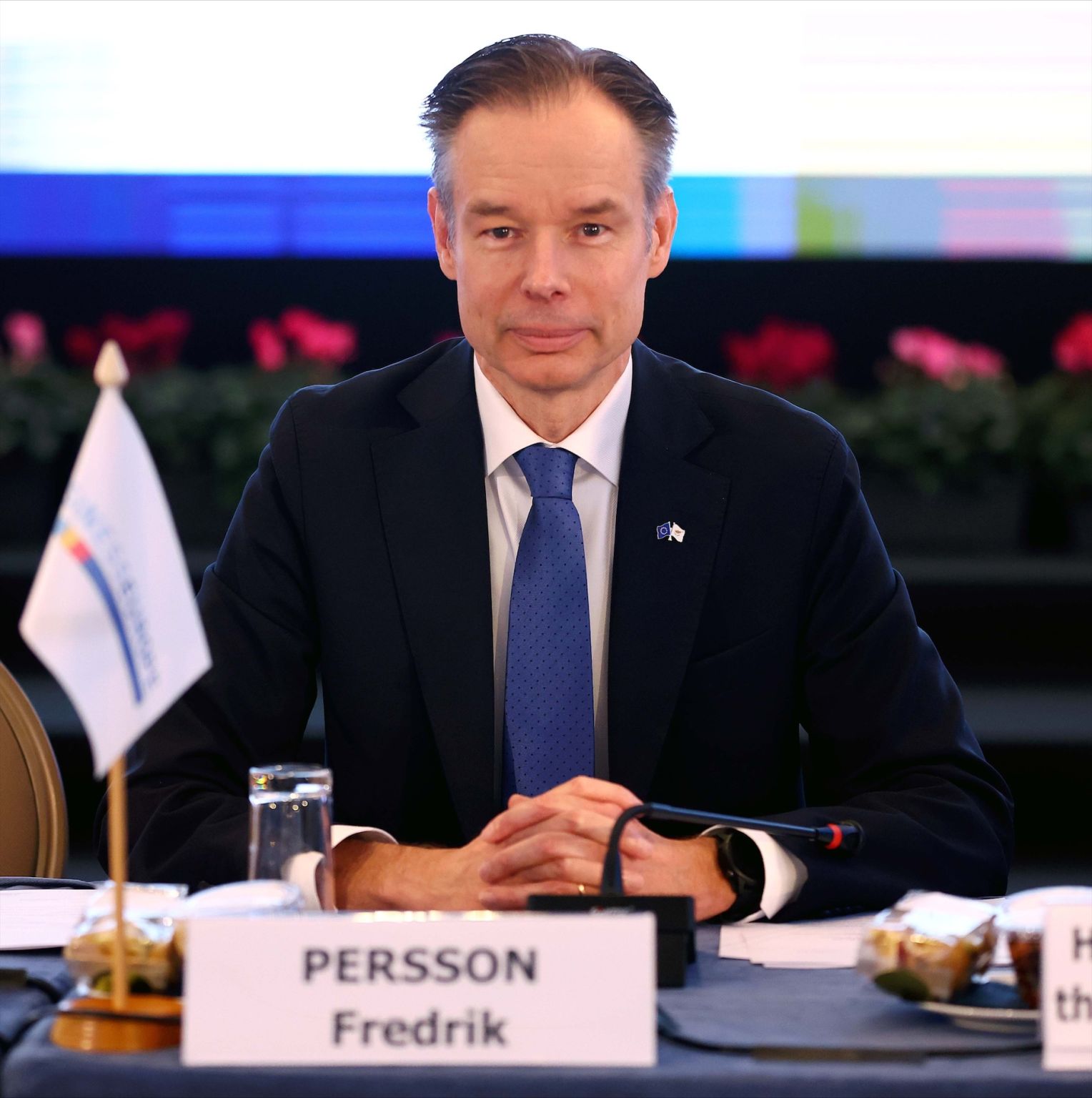European businesses expect the upcoming Cyprus Presidency of the Council of the EU to deliver concrete progress on competitiveness and regulatory simplification, according to Fredrik Persson, president of BusinessEurope, during an interview at Cyprus News Agency (CNA).
The organisation brought together the heads of its member federations on November 20 to 21, ahead of Cyprus assuming the rotating presidency on January 1, 2026, to outline priorities for the next institutional cycle.
BusinessEurope represents 42 federations in 36 countries, covering around 25 million companies, with Cyprus’ Employers and Industrialists Federation (Oev) described by Persson as an important voice within the group.
He said the message from companies across Europe is “absolutely clear”, pointing primarily to excessive regulatory pressure.
As he noted, “regulation, regulation, regulation” remains the biggest obstacle, especially for SMEs, which make up 99 per cent of its membership. He added that firms were “overburdened by over-bureaucracy”, and argued that Europe must “unleash the power of business”.
Linked to this, Persson emphasised competitiveness as a second core concern, saying that these two themes resonate “whether you are here in Nicosia, in Helsinki or in Lisbon”.
Asked what is holding Europe back, he pointed to the Draghi and Letta reports on competitiveness and the Single Market. He said the underlying issue is long-standing, noting that “Europe has been left behind”, with US economic growth far outpacing the EU over the past three decades.
As he put it, the US economy has doubled, while the EU has expanded by just over 60 per cent, leaving less fiscal space for security, social welfare and investment.
“If we do not invest in the future, Europe will become a worse place to live,” he said.
Persson also warned about the rising cost of compliance, saying companies now spend as much on meeting regulatory requirements as they do on innovation.
He described it as unsustainable that “the compliance department, is as big as the department that files patent applications”, adding that over-production of legislation slows down Europe.
By comparison, he noted that more than 13,000 pieces of legislation were adopted during the previous EU Commission mandate, against 3,500 at US federal level.
Against this backdrop, he said the Cyprus Presidency arrives at a pivotal moment, dismissing the notion that presidencies matter only for large member states.
He argued that Europe is “at a crossroads” and that although the Commission has “started to make the right decisions”, businesses do not yet feel a real shift in their daily operations.
“Until it happens there, it has not happened at all,” he said.
Persson emphasised the importance of the so-called “omnibus” package designed to facilitate business activity, insisting it must advance during Cyprus’ term.
He described it as both a major responsibility and an opportunity, saying the presidency “will be extremely important”. He also pointed to smaller but decisive initiatives, including the e-posting framework governing the posting of workers, which he described as vital for mobility within the EU.
Although Europe considers itself a Single Market, Persson noted that only 20 per cent of trade takes place between EU member states, compared with 70 per cent between US states.
He said this lack of mobility hampers economic performance, adding that Cyprus, a country whose people “travel, study and do business abroad”, understands the importance of cross-border freedom.
Pressed on whether tangible results can realistically be achieved by July, when the presidency ends, he said yes. He argued that businesses would not accept further delays in Brussels and that BusinessEurope would work closely with Cyprus and the Oev.
“I am convinced that we will have an impact that will not surprise me, but may surprise some in Brussels,” he said.
Looking ahead, he set out three areas BusinessEurope considers essential. First is simplification, noting again that Europe “cannot continue to invest the same amount in compliance as in research and innovation”.
Second is deepening the Single Market, where he cited IMF analysis suggesting internal barriers are equivalent to tariffs of almost 50 per cent on goods and over 100 per cent on services.
“We are causing this to ourselves,” he said, arguing that removing such obstacles would unlock major gains in growth and competitiveness.
Third is the labour market. With Europe facing an ageing population, Persson said that by 2050 some 35 million Europeans will leave the workforce.
He warned of major skills shortages as AI and new technologies reshape industry. Rather than unemployment, “we’ll be fighting to find the right talent,” he said.
Energy costs remain another pressure point, as Europe is less competitive than the US and China.
He called for technological neutrality, improved interconnections and diversified sources, noting that “there are initiatives from Cyprus for natural gas, and it’s better to have it from within Europe than from elsewhere”. Competitive energy prices, he said, are now essential to prevent business closures.
Turning to trade, he described the US as Europe’s largest partner but acknowledged recent tensions. He argued that the current framework with Washington is not perfect or fully balanced but remains preferable to a trade war. He also said that agreements with Mercosur, Mexico, Indonesia and India would help diversify EU options and rebalance relations with both the US and China.
Although Europe has a “dependency on China”, he said the relationship involves both opportunities and challenges, requiring a “balanced approach” and effective use of trade defence tools.
Persson concluded that he has high expectations for the Cyprus Presidency and expressed confidence in the role of Oev. “I am also absolutely certain that it will be a huge success,” he said.






Click here to change your cookie preferences